Artists have always delighted in playing notes that are not in the scale, or painting outside the lines, or staging plays is odd places. After a few weeks of hand-wringing, Kansas City’s performing-arts leaders dug in and created a fall season the likes of which we have never seen. Audiences will have access to a greater mix of music, dance, and theater this fall than ever before, from concerts in public parks to a flood of online content.
“We see the present situation as an opportunity to innovate,” said Danny Beckley, the Kansas City Symphony’s executive director, in announcing that the full orchestra would be on contract this season. “In the coming months you will see the Symphony reaching every corner of the Kansas City region.” In July, the Kauffman Center announced it would close its doors through December due to safety concerns. Few were deterred.
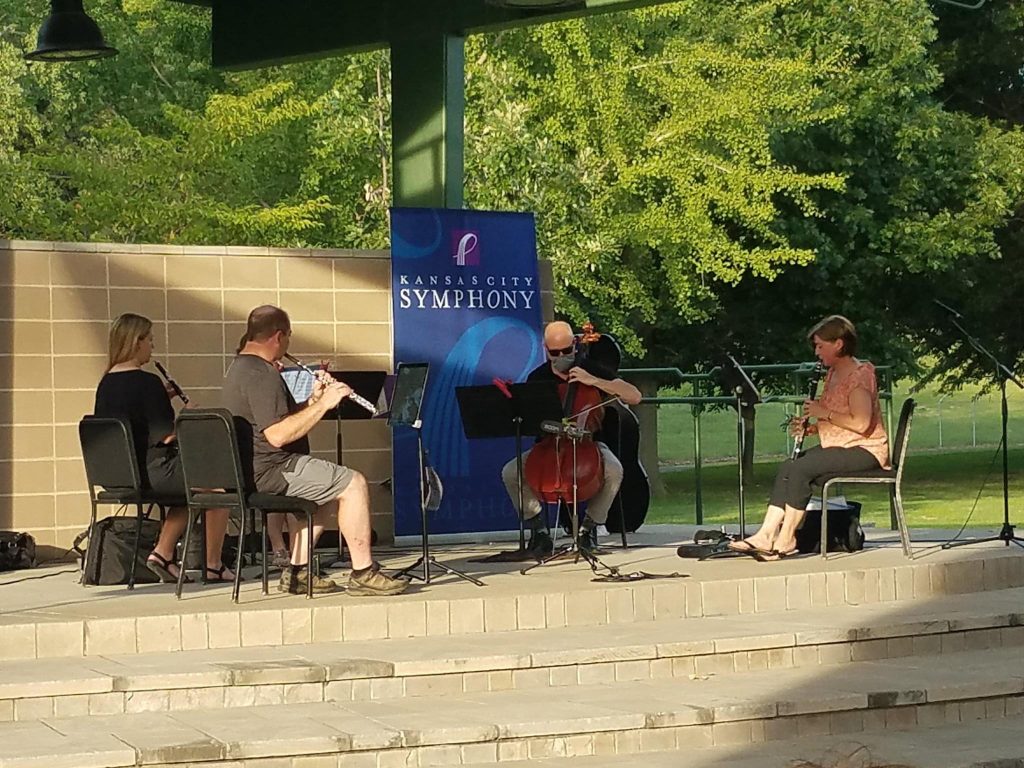
Kansas City Symphony members Kristina Fulton, Michael Gordon, Alexander East, and Elena Lence Talley performed recently at a free concert in Macken Park. (out of camera range) Elizabeth Gray
“With every challenge comes opportunity,” Danny said. “We have a window of opportunity now to quickly implement a radical new means of mobile music performance.” The Symphony’s idea is to create concerts that are “like getting delivery from your favorite restaurant,” he added. “But instead of pizza or barbecue, we’ll be delivering live music via a brass quintet or string quartet right in your neighborhood.”
Technology is also playing a central role in this transformation: Videographers are much in demand these days. “The classical arts have been slower to adapt and take advantage of newer technology,” said Matthew Shepard, founding director of Te Deum, a chorus that has announced an all-online fall season. “Now we’re being forced to, and I don’t think we’ll ever go back to ‘normal.’ We’ll come out of it more advanced, and better able to reach wider audiences. … People and times are evolving and it’s important that we be a part of it.”
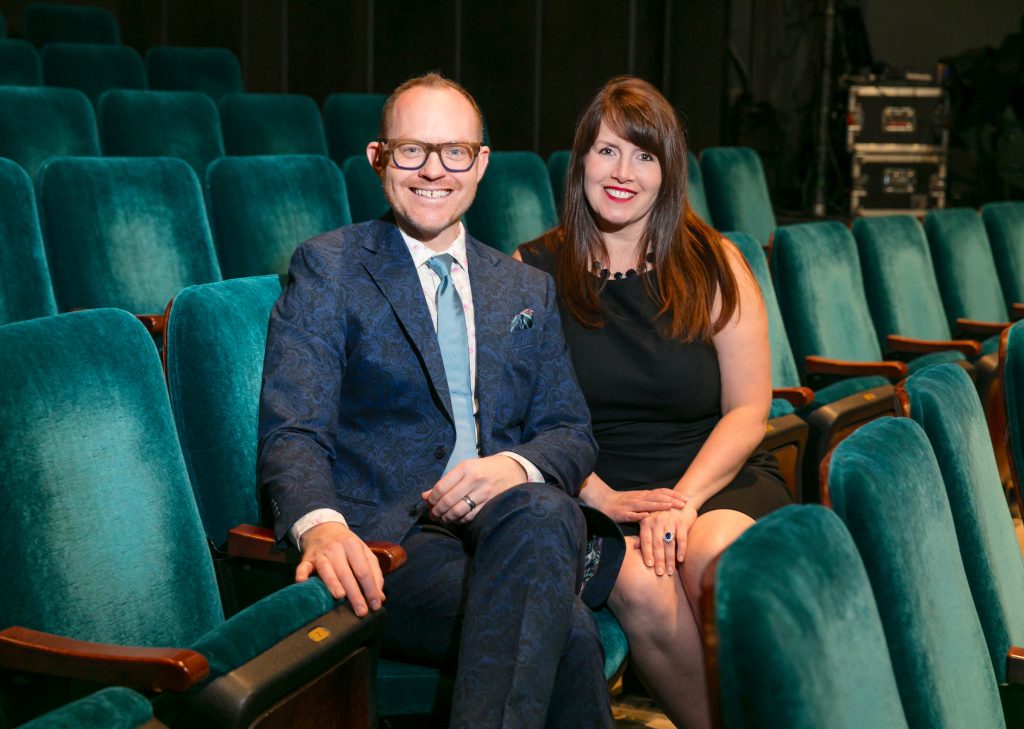
Stuart Carden and Angela Gieras, Kansas City Repertory Theatre / Photo by Ashley Elwell
Several groups are reaching far outside their comfort zones, combining live events, streamed performances, and even experiments in “Zoom theater.” “Because the traditional way we tell stories on stage has been disrupted, we are invited to try things we never have before,” said the Kansas City Repertory Theatre’s Stuart Carden and Angela Gieras in a joint statement. “This has encouraged us to partner with new organizations, expand our artistic circle, think deeply about who we are serving, and work with new technologies. We are also learning more than we ever could have imagined about aerosol transmission and air filtration systems.”
Newer buildings often have the HVAC systems necessary to pass newly formulated safety standards, but many older facilities have to be retrofitted. Still, this has hardly been the primary concern for the Unicorn Theatre’s Cynthia Levin, who recently replaced most of the building’s filtration system just in case the company is able to perform live.
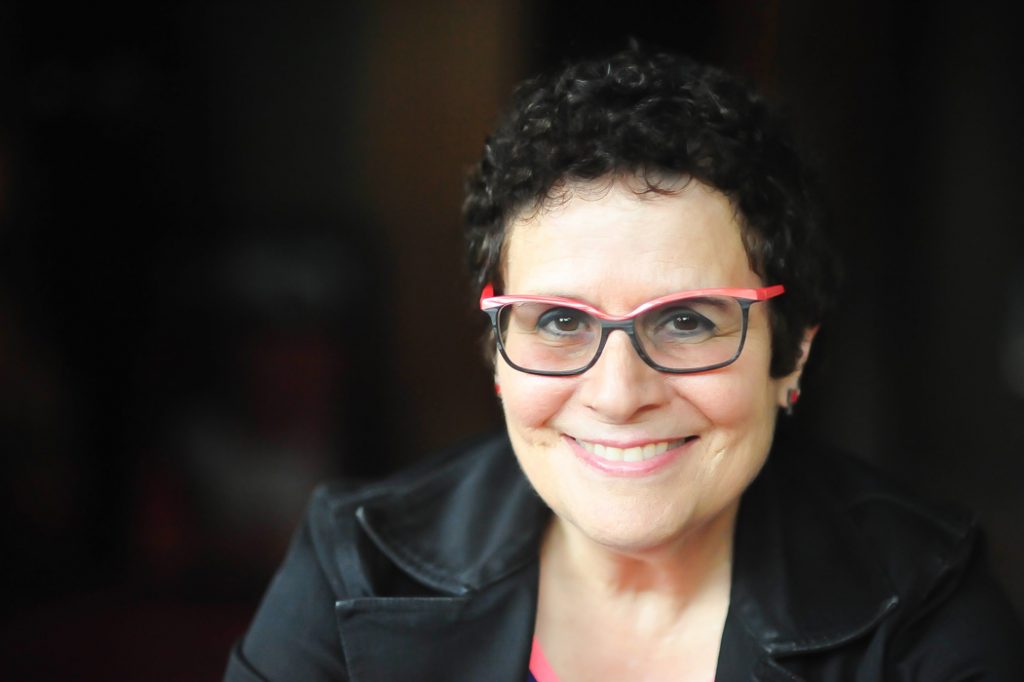
Cynthia Levin, Unicorn Theatre / Photo by Manon Halliburton
Cynthia and her team spent the summer drastically altering their fall season, with readings and online virtual performances of brand-new plays. “A lot has changed since George Floyd and the protests and Covid-19, so I’m looking for plays of the time,” Cynthia said. “We talk about the topics that are foremost on our minds right now.”
One of these plays is James Ijames’ Kill Move Paradise dealing with the murders of Black men and women in America, which the Unicorn presents for on-demand virtual streaming from September 30th through October 11th, directed by Damron Russel Armstrong. Another is Our Black Death, a play by Lindsay Carpenter originally set in plague-ridden 13th-century Europe, a reading of which will be streamed on October 25th via YouTube Live.
“She wrote it before the pandemic, it’s an incredible coincidence,” said Cynthia, who has helped adapt Lindsay’s piece for a streamed reading. “It’s amazing because of the similarities to what is happening now. … It has a very contemporary perspective.”
Organizations that are nimble and open to change are the most likely to survive this tricky half-season. In lieu of live events, the Kansas City Actors Theatre has announced a weekly radio series through March 2021, in partnership with KKFI-FM.
“It’s kind of cool,” Cynthia said, “all of the new things we’re having to learn. … I don’t think I would have chosen this, but we’re learning a lot, and I know we’re going to make it through.”
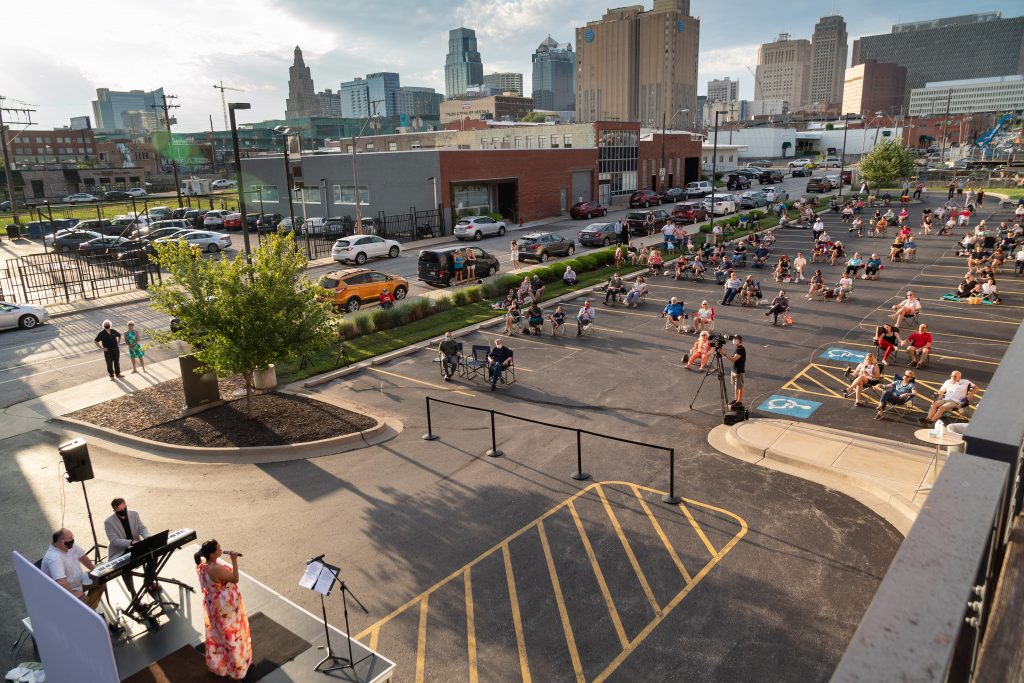
Vocal soloists performed recently at Soundscapes of the City, the Lyric Opera’s well-distanced outdoor summer concert series, at the Opera Center parking lot. / Photo by Don Ipock
Two other major organizations are planning live holiday events this fall (in addition to other presentations), taking extensive steps to assure the safety of audience and artists. “One of the things we’re planning is a holiday family chamber opera,” said Deborah Sandler, the Lyric Opera’s general director, who added that she is committed to using local talent for this fall’s presentations.
This event will be held in the company’s vast Opera Center, which can normally accommodate 350 but will be fitted for an audience of around 100 to 125 well-spaced opera fans. “We are trying to curate things that are doable and of interest to our audiences,” Deborah said.
The Kansas City Ballet’s “holiday special” will also be presented indoors, to about 50 audience members at a time in the expansive Frost Studio. “It will include excerpts and variations from The Nutcracker,” said Devon Carney, the Ballet’s artistic director, “but also a lot of other holiday-themed works, just to get us in a good mood.”
The program includes solos and duets, at least, though for safety’s sake only dancers who actually cohabitate can perform together. “It’s a good opportunity for our supporters to join us in person,” Devon said, “and help us realize that family and community are what matters during this crazy time.”
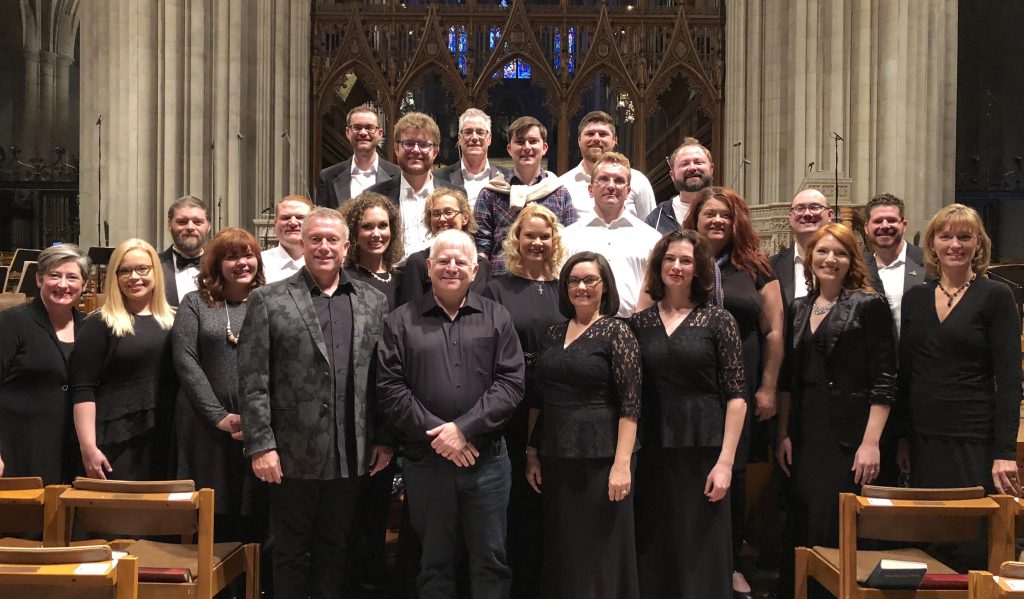
The Kansas City Chorale recently joined two other choirs and the Orchestra of St. Luke’s for a Naxos recording of Alexander Kastalsky’s Requiem for Fallen Brothers (1914-17), led by conductor Leonard Slatkin (front row, fifth from left) and recorded at Washington National Cathedral, shown here. / Photo by Paul B. Jones
Several ensembles are venturing outdoors, for as long as weather permits. “We have targeted outdoor spaces for free public performances where our singers will perform in small groups and the public can spread out,” said Brian Pinkall, manager for production and visual marketing (and a longtime tenor) for the Kansas City Chorale.
In the meantime, the Chorale has released a stellar new recording, which sat at the top of the Billboard Classical chart for several weeks this summer. Together with two other choirs and the Orchestra of St. Luke’s, the Chorale made a Naxos label recording of Alexander Kastalsky’s Requiem for Fallen Brothers (1914-17), led by conductor Leonard Slatkin and recorded at Washington National Cathedral. (Frankly it seems like a shoo-in for a Grammy Award nomination or two.)
Kansas City Repertory Theatre recently announced six performances of Ghost Light: A Haunted Night of Songs and Stories from KC’s Cultural Crossroads, a hybrid of concert and spooky storytelling, to be held October 22nd through the 31st on the South Lawn of the Nelson-Atkins Museum of Art.
Te Deum will begin its season with streamed rebroadcasts of its 2016 performances of Brahms’ German Requiem, available on October 19th and November 1st. Now “Missouri ArtSafe certified,” the choir has recently begun rehearsing, with masks and safe distancing, and hopes also to present live-streamed performances of its holiday-themed Peace and Joy concert (which will be made available for viewing on December 11th and 14th).
These are just fragments of an amazing array of offerings being announced, often in a spontaneous manner that is appropriate to the times. “Our Fall season is unlike anything we have ever done before,” said Ben Spalding, artistic director of Spire Chamber Ensemble, in a statement. “But we are committed to offering content that will continue to thrill, comfort, and excite. … We are convinced that music is an important part of our healing from this pandemic and we look forward to sharing this with you.”
—By Paul Horsley
To reach Paul Horsley, performing arts editor; send an email to paul@kcindependent.com or find him on Facebook (paul.horsley.501) or Twitter (@phorsleycritic).